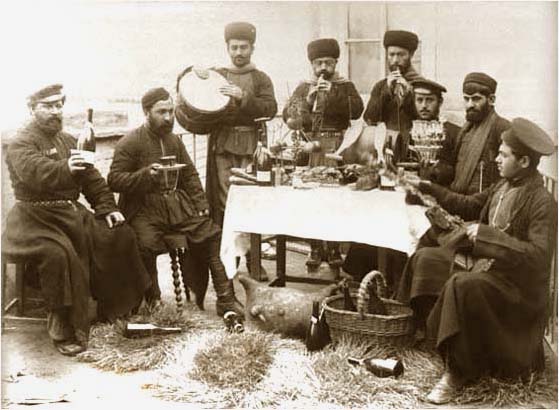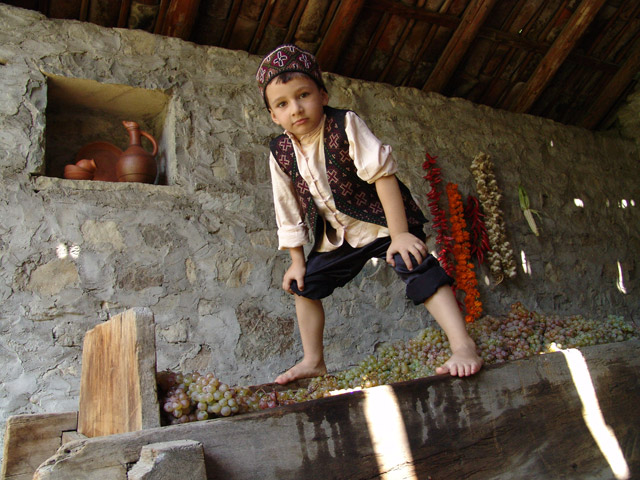![]() 
In the land of the Golden Fleece, the cooking of the republic of Georgia is usually accompanied by wine. Just as Georgia was once the orchard of Russia, the czars and the Soviets, it was also the vineyard.
On the silk road between Asia and Europe, the caravans used to stop at Tiflis. Now called Tbilissi, it’s filled with the scent of coriander, basil and tarragon, not to mention its famous walnut sauce. Walnuts find their way into all kinds of sauces and seasonings, often crushed with saffron.
Visitors are surprised and charmed by the natural flavors of products from the Georgian countryside: fruits and vegetables with forgotten flavors, traditional dairy products like matsoni (buffalo milk yogurt), and meats that form the basis of the simple yet refined traditional cooking. Everywhere, and for a modest price, you can treat yourself to a simple flat bread with cheese, still hot from the oven, a Georgian salad flavored with herbs, and grilled meat or fish kebabs served with sauces made from plums, pomegranates and the spices of which Georgians are so fond.
A Georgian meal can last for hours, with the head of the table (the tamada) obliged to make a toast in honor of every guest. Dishes don’t follow any strict classification, especially since their preparation is subject to regional variation.
Cooking over coals or vine branches is popular, though the most typical method is ketsie, which consists of mushrooms or other vegetables and offal roasted on a clay plate with onions and herbs.
Georgian bread, called lavash, is a staple of the local diet. Unlike the usual bakery bread, it is baked to order vertically, stuck to the side of the oven. Lavash comes in all shapes, each a unique "signature” of the baker.
First courses
Khatchapouri is another staple, a flat bread found on every street corner and in every restaurant in Georgia. There are various kinds: khatchapouri with cheese, Adjara-style, koubadie (with meat), lobianie (with beans)…
You must also try khinkalis, a local variation of Chinese dim sum. These are dumplings stuffed with meat and lots of onions. In the plains, they use ground meat: beef, lamb or pork, or a combination of two meats. In the mountains, they prefer the meat finely chopped. Depending on the region, they are served with black pepper or erbo, melted butter. But in order to eat them as the Georgians do requires some training, since the rule is that not a single drop of juice can be allowed to escape onto the plate. So you have to make a little hole in order to suck out the juice before biting into the dumpling!
Other specialties include batibouti (roasted corn kernels), soulgouni (cooked cheese), kitri (pickles), pamidori (tomatoes) and mtsvanili (aromatic herbs). You can enjoy mtchadie (cornbread), plain or with cheese, and atchma (puff pastry with cheese).
Soups
Sorrel soup, sturgeon soup, mushroom soup
Borscht
Tchihirtma (chicken broth with egg, herbs and vinegar)
Khartcho (beef broth with rice, herbs and walnuts)
Khashi (beef offal cooked with cow’s feet and garlic)
Meat and poultry
Mtsvadi (shashlik) is the most convivial custom of the Balkans and central Asia, and has become established as a true institution in Georgia. It consists of skewers of meat grilled over vine branches. Most common is mutton marinated in vinegar and onions, but you’ll also find pork and beef. Some cooks replace the vinegar with wine and season the meat with a spice mixture called basturma.
If you happen to be in Georgia during the New Years celebrations, don’t miss the delicious chicken or turkey satsivis in walnut sauce, served with mchadi (corn cakes) or ghomi (made with cornmeal, similar to Italian polenta), depending on the region.
Chicken: Bajé (with saffron and walnuts – see seasonings), tchahohbilie (chicken braised with onion, tomatoes and herbs), chicken "tabaka” (cooked on a clay plate in a sauce with garlic), satsivi (walnuts, onion and coriander), tsitsila (grilled), or roast chicken with blackberry sauce.
Lamb and mutton: bozbachi (with potatoes and peas); tchanakhi (mutton braised with eggplant, tomatoes and herbs), tolma (lamb in vine leaves), tchakapouli (lamb braised in wine and herbs), and tchakhokhbili (stew).
Beef: Bastourma (marinated in vinegar and lemon with onions), tchakhokhbili (stew), Lu-La "Suliko” (tender beef stuffed with onion, garlic and herbs and served with a grape and pomegranate sauce).
Veal: Bouglama (with tomatoes), rvidzli (liver).
Pork: Koupati (with red peppers), moujouji (pig’s feet).
Fish
Sturgeon is the uncontested king, followed by trout, brill and catfish. They are prepared as bagie (in walnut sauce) or kindzmaras (in coriander and vinegar sauce). You can also try skewers of sturgeon cooked over the coals, sturgeon "Maréchal” in a mushroom sauce, or "red-eye” sea mullet, fried whole to serve 3 or 4 people.
Vegetables
Pkhali is a mixture of spinach, beets and other vegetables cooked with walnuts, garlic and spices – a staple at every banquet, served with several sauces.
Badrijani (eggplant with walnuts), lobio (kidney beans with walnuts), cimindi (cooked ears of corn), romi (cornmeal), mtchadi (cornbread), soko (grilled oyster mushrooms).
Sauces
Bazhe (creamy spiced walnut sauce)
Tkhemali (bitter prune sauce)
Ajika (chopped herbs, spices and walnuts)
Suliko (grape and pomegranate sauce)
Satsebelie (spicy tomato sauce)
"Sharp” (tomato sauce with cayenne pepper)
"Sharp” (tomato sauce with cayenne pepper)
Pomegranate sauce (with walnuts and herbs)
Horseradish
Mustard
Soluguni cheese is a stringy curd cheese, something like mozzarella, that is used in numerous dishes. It is used plain or flavored with mint. Other cheeses include Georgian "Gouda” made with milk from sheep that graze in the mountains, and nadugi (homemade cottage cheese). Goglimogli, a kind of eggnog, is also popular.
Seasonings and condiments
Basil, celery, coriander, tarragon, parsley, garlic and onion, salt and pepper, red and green chilies, saffron, vinegar and oil, tremali (sloe sauce), tsnili (pickled cucumbers, tomatoes and vegetables).
When it comes to grilled meat and poultry, "Bajé” is unequalled. 500 g (18 oz.) of walnuts and 20 g (2/3 oz.) saffron are crushed together. Then the mixture is pressed to obtain a fragrant, richly-colored oil to brush over meat and poultry.
Waters
The country’s geography shows a particularly rich potential for mineral water, since there are thousands of springs that could be developed.
Borjomi water is sparkling mineral water prized not only in Georgia but in many other eastern countries.
Laridze water is a soda invented during the time of the czars, that was the delight of aristocrats at Tiflis in the early 20th century. "Kintos,” smooth-talking dancers and singers, decked out in wide pants and black caps, used to sell it in the street. Batibouti and Sazamtro were also available, depending on the season.
Wines
The Kakhetie region has been renowned for centuries for its wines and many cellars.
White wines, fairly dry, were traditionally reserved for men, while the sweeter red wines were set aside for women.
Among white wines, we can mention: Gourdjaani, Terta, Tsinandali and Vasisoubani; among reds, Kindzmaraouli, Khvanchkara, Moukouzani, Napareouli, Ojaleshi, Saperavi, Teliani, Tibaani; and Manavi among sparkling wines.
Georgians have a highly developed tradition of hospitality: paying honor to their guests is a duty, even if it means that they themselves must go without for weeks. Georgians have adopted the philosophy of the epic poet Chota Roustaveli, who in the late 12th century wrote: "What you give away is yours, what you keep is lost forever.”

|



